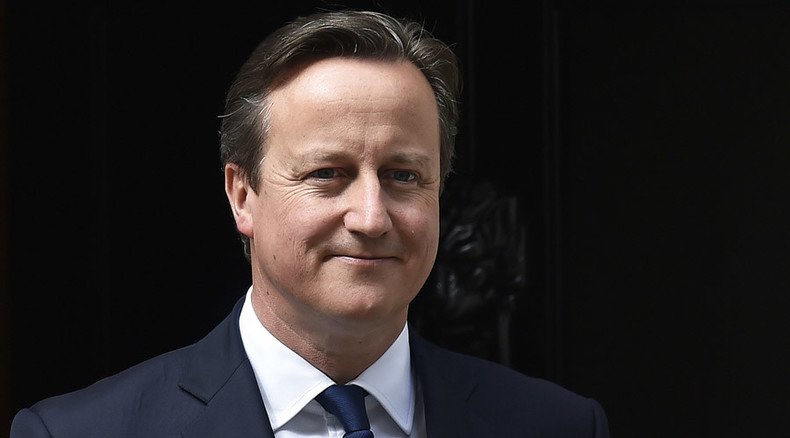Cameron unveils crackdown on ‘anti-British’ Muslims

Prime Minister David Cameron has unveiled the introduction a five-year plan to combat extremism in the UK, pledging to tackle the “failures of integration” which have led vulnerable young people leaving Britain to join extremist groups.
In a speech in Birmingham, the PM said he wants to “lift the horizons” of communities which have been ostracized in the past and use greater re-integration to prevent radicalization.
The Prime Minister said that the root cause of extremism was "ideology" and pledged to build the bridges between the government and disenfranchised communities.
He also revealed that parents who believed their children were at risk of radicalisation would have the powers to take away their passports.
More than 700 Brits are feared to have left the country to join fundamentalist groups in Syria including Islamic State (IS, formerly ISIS/ISIL), with nearly half returning back to the UK.
Cameron told a US television network on Sunday he hoped the UK would “do more” to “destroy this caliphate.”
Some commentators welcomed the speech as a more "nuanced" portrayal of the Conservative's battle against extremism than previous speeches.
That was quite a speech from David Cameron. Lots of breadth and nuance - but suspect it won't convince his detractors.
— Shiraz Maher (@ShirazMaher) July 20, 2015Cameron's speech on extremism more nuanced and interesting than media briefings suggested. Will make it difficult to oppose, for many.
— Sunny Hundal (@sunny_hundal) July 20, 2015But Prof Andrew Silke, a counter-terrorism specialist, said the Prime Minister was "barking up the wrong tree," adding that for many vulnerable young people, radicalisation comes about because of identity problems, not through militant ideology.
"The key message is that you have got to see the terrorists as they see themselves if you genuinely want to understand why people are getting involved. If you talk to terrorist themselves, they portray themselves as altruists – they see themselves as fighting on behalf of others, whether it’s the IRA fighting on behalf of the Catholic community in Northern Ireland, or if it’s Islamic State fighting on behalf of the Muslim ummah" he told the Guardian.
Journalist Glenn Greenwald further condemned the speech as "creepy" and "authoritarian".
David Cameron is right at this moment delivering one of the creepiest and most authoritarian speeches you'll ever hear.
— Glenn Greenwald (@ggreenwald) July 20, 2015On Monday, Cameron said: “For all our successes as a multi-racial, multi-faith democracy, we have to confront a tragic truth that there are people born and raised in this country who don’t really identify with Britain and feel little or no attachment to other people here."
Watch pro-Islamists froth at the mouth today, in the sort of incandescent rage that only theocrats can muster, after PM Cameron's speech.
— Maajid Nawaz (@MaajidNawaz) July 20, 2015“So when groups like ISIL seek to rally our young people to their poisonous cause, it can offer them a sense of belonging that they can lack here at home, leaving them more susceptible to radicalism and even violence against other British people to whom they feel no real allegiance.”
He will add that fundamentalist groups can seem “exciting” to marginalized communities in the UK because of the failure to integrate with other communities across the country.
“This is what we face: a radical ideology that is not just subversive, but can seem exciting, one that has often sucked people in from non-violence to violence, that is overpowering moderate voices within the debate and which can gain traction because of issues of identity and failures of integration.”
Home Secretary Theresa May told the BBC on Monday morning that Cameron’s speech will outline a series of plans which are part of a wider response, to be fully released in September.
The PM has previously condemned British Muslims for “quietly condoning” the IS, and has urged them to do more to combat radicalization in the own community.
His speech further rejected the idea that British foreign policy is responsible for the rise of Islamist extremism in the Middle East.
“I am not saying these issues aren’t important. But let’s not delude ourselves. We could deal with all these issues and some people in our country and elsewhere would still be drawn to Islamist extremism,” he will say.
“No, we should be clear: the root cause of the threat we face is the extremist ideology itself,” he said.
Cameron will also issue a warning to young people lured by the Islamic State’s ideology.
“You won’t be some valued member of a movement. You are cannon fodder for them. They will use you.
“If you are a boy, they will brainwash you, strap bombs to your body and blow you up. If you are a girl, they will enslave and abuse you. That is the sick and brutal reality of ISIL,” he will add.
“We must de-glamorize the extremist cause, especially ISIL. This isn’t a pioneering movement, it is vicious, brutal, fundamentally abhorrent.”












